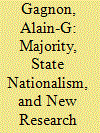| Srl | Item |
| 1 |
ID:
172048


|
|
|
|
|
| Summary/Abstract |
In this contribution, Alain-G Gagnon reflects on existing scholarship on majority and state nationalism, arguing that minority and majority nationalism are broadly similar in their intent. Both seek to promote a set of values, myths and meaning systems within a given political community which exists on a specific territory, shares a common language and a history. As a result, there are several promising avenues for research on state and majority nationalism, outlined in this piece.
|
|
|
|
|
|
|
|
|
|
|
|
|
|
|
|
| 2 |
ID:
172044


|
|
|
|
|
| Summary/Abstract |
Drawing from the literatures on strategic identity shift and on signaling, this article examines the strategies used by Beijing to impose its monist brand of state nationalism on Hong Kong. Given the nominally high degree of autonomy granted to Hong Kong, Beijing has been unable to impose its nationalism directly from above. Instead, it has made use of cooptation strategies so as to cultivate increasingly vocal and influential loyalist circles among local elites, who have promoted state nationalism from within. This logic, this article argues, has led many among Hong Kong’s political elite to compete in expressing an increasingly overt Chinese nationalistic posture as a way to signal loyalty to Beijing. These strategies have however backfired, raising doubts as to the actual extent of Hong Kong’s autonomy and triggering an existential crisis that led to the emergence of a reactive form of popular Hong Kong sub-state nationalism. In this context, state and popular sub-state nationalisms have fed on each other and grown increasingly irreconcilable, echoing the intensifying radicalization and polarization between the authoritarian establishment and the democratic opposition.
|
|
|
|
|
|
|
|
|
|
|
|
|
|
|
|
| 3 |
ID:
172046


|
|
|
|
|
| Summary/Abstract |
This paper examines the way party elites in the UK and Spain discursively construct the nation and justify state integrity in the face of resurgent Catalan and Scottish demands for self-determination and independence. While in each case there is a plurality of conceptions of the state, in Spain the demos is predominantly defined as a single, indivisible nation of equal citizens while in the UK the focus is typically on a plurinational Union. This, we contend, shapes the arguments made in favor of state unity. The dominant case for state integrity in Spain is more negative, focused primarily on the unconstitutionality of independence and delegitimizing the independence agenda. In the UK, the predominant appeal to the Union is more positive and instrumental: as the country is perceived as a partnership entered into willingly, a case must be made for its continuation. This paper seeks to contribute to the understanding of state nationalism and political dynamics in plurinational states by shedding light on the ways in which party elites understand and legitimize the state at moments of profound internal challenge.
|
|
|
|
|
|
|
|
|
|
|
|
|
|
|
|